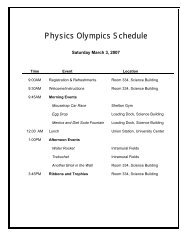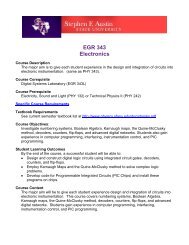Student Learning Outcomes
Student Learning Outcomes
Student Learning Outcomes
Create successful ePaper yourself
Turn your PDF publications into a flip-book with our unique Google optimized e-Paper software.
Engineering – Spring 2009<br />
EGR Courses: 111, 112, 215, 250, 321, 343<br />
Program <strong>Learning</strong> <strong>Outcomes</strong> (Undergraduate Program):<br />
1. The student will demonstrate proficiency in the basic and applied fields of<br />
engineering.<br />
2. The student will apply physical principles to novel situations, both in the<br />
classroom and in research settings.<br />
3. The student will develop good experimental technique, including proper setup<br />
and care of equipment, conducting experiments and analyzing results in order to<br />
observe physical phenomena, assess experimental uncertainty, and make<br />
meaningful comparisons between experiment and theory.<br />
4. The student will develop effective written and oral communication skills,<br />
especially the ability to transmit complex technical information in a clear and<br />
concise manner.<br />
5. The student will be able to work effectively in groups or teams.<br />
6. The student will appreciate the importance and practice of ethics in science.<br />
Methods of Assessment:<br />
A. Embedded questions<br />
B. Laboratory Rubric<br />
C. Major Field Assessment Test (MFAT)<br />
a. Ties to professional recommendation<br />
b. Possibly refund fee if student scores above national average<br />
D. Teamwork Rubric<br />
E. Independent Study Rubric<br />
F. Seminar Rubric<br />
G. Ethics Survey
<strong>Learning</strong> Objective -Assessment Method Matrix<br />
Objective Method When Who<br />
1 A<br />
C<br />
2 B<br />
E<br />
3 B<br />
E<br />
4 B<br />
F<br />
5 D<br />
D<br />
6 G<br />
A<br />
Periodically through each course<br />
Senior Year<br />
Laboratory rubric in the labs<br />
Independent Study Evaluation Rubric at<br />
conclusion of 475/476<br />
Laboratory rubric in the labs<br />
Independent Study Evaluation Rubric at<br />
conclusion of 475/476<br />
Independent Study Evaluation Rubric at<br />
conclusion of 475/476<br />
Seminars delivered using Seminar<br />
Rubric<br />
Teamwork rubric in 475/476<br />
Teamwork rubric in 108, 250, 320<br />
Senior Year<br />
At least every other year in core<br />
courses<br />
Course Instructor<br />
Instructor of PHY470<br />
Course Instructor<br />
Course Instructor<br />
Course Instructor<br />
Course Instructor<br />
Course Instructor<br />
Faculty in attendance<br />
Course Instructor<br />
Course Instructor<br />
Instructor of PHY470<br />
Course Instructor
Assesment Method-<strong>Learning</strong> Objective Matrix<br />
Method Objective When Who<br />
A 1<br />
6<br />
B 2<br />
3<br />
4<br />
Periodically through each course<br />
At least every other year in core<br />
courses<br />
Laboratory rubric in the labs<br />
Laboratory rubric in the labs<br />
Independent Study Evaluation Rubric at<br />
conclusion of 475/476<br />
Course Instructor<br />
Course Instructor<br />
Course Instructor<br />
Course Instructor<br />
Course Instructor<br />
C 1 Senior Year Instructor of PHY470<br />
D 5<br />
5<br />
E 2<br />
3<br />
Teamwork rubric in 108, 250, 320<br />
Teamwork rubric in 475/476<br />
Independent Study Evaluation Rubric at<br />
conclusion of 475/476<br />
Independent Study Evaluation Rubric at<br />
conclusion of 475/476<br />
Course Instructor<br />
Course Instructor<br />
Course Instructor<br />
Course Instructor<br />
F 4 Seminars delivered using Seminar<br />
Rubric<br />
Faculty in attendance<br />
G 6 Senior Year Instructor of PHY470
EGR 111 – Foundations of Engineering I<br />
By the end of the course, a successful student will be able to:<br />
<strong>Student</strong> <strong>Learning</strong> <strong>Outcomes</strong><br />
Outcome<br />
Understand the requirements to be a professional engineer 1<br />
Demonstrate engineering teamwork skills 5<br />
Identify good engineering ethics 6<br />
Differentiate the most popular engineering disciplines 1<br />
Understand the fundamentals of engineering drafting 4<br />
EGR 112 – Foundations of Engineering II<br />
By the end of the course, a successful student will be able to:<br />
<strong>Student</strong> <strong>Learning</strong> <strong>Outcomes</strong><br />
Outcome<br />
Recognize the fundamentals of thermodynamics 1<br />
Construct two simple heat engines 3<br />
Demonstrate engineering teamwork skills 5<br />
Apply basic conservations principles when solving engineering<br />
problems<br />
2<br />
Identify the fundamentals of engineering statics and dynamics 1
EGR 215 – Principles of Electrical Engineering<br />
By the end of the course, a successful student will be able to:<br />
<strong>Student</strong> <strong>Learning</strong> <strong>Outcomes</strong><br />
Demonstrate a clear understanding of the theory and function of<br />
basic circuit components such as resistors, capacitors, inductors,<br />
diodes, transistors, transformers, and semiconductor devices.<br />
Outcome<br />
1, 3<br />
Design and construct DC transient and AC filter circuits. 3, 5<br />
Build digital logic circuits using integrated circuit gates and interpret<br />
their operation.<br />
3, 4<br />
EGR 250 – Engineering Statics<br />
By the end of the course, a successful student will be able to:<br />
<strong>Student</strong> <strong>Learning</strong> <strong>Outcomes</strong><br />
Demonstrate an advanced level knowledge and understanding of<br />
Newton’s First Law and its application to engineering.<br />
Show quantitative and analytical skills necessary to solving<br />
physics/engineering problems.<br />
Exhibit effective written and oral communication skills in<br />
presentations of physics/engineering problems to one’s peers.<br />
Outcome<br />
1<br />
1<br />
4<br />
Work effectively as a member of a group. 5
EGR 321 – Engineering Dynamics<br />
By the end of the course, a successful student will be able to:<br />
<strong>Student</strong> <strong>Learning</strong> <strong>Outcomes</strong><br />
Demonstrate an advanced level knowledge and understanding of the<br />
laws of classical mechanics to include representing these laws in<br />
mathematical expressions with appropriate units for physical<br />
quantities.<br />
Show quantitative and analytical skills necessary to solving<br />
physics/engineering problems.<br />
Exhibit effective written and oral communication skills in<br />
presentations of physics/engineering problems to one’s peers.<br />
Outcome<br />
1<br />
1<br />
4<br />
Work effectively as a member of a group. 5<br />
PHY 343 - Electronics<br />
By the end of the course, a successful student will be able to:<br />
<strong>Student</strong> <strong>Learning</strong> <strong>Outcomes</strong><br />
Design and construct digital logic circuits using integrated circuit<br />
gates, decoders, counters, and flip-flops.<br />
Employ Karnaugh Maps and the Quine-McClusky method to solve<br />
complex logic problems.<br />
Develop code for Programmable Integrated Circuits (PIC Chips) and<br />
install these programs on chips.<br />
Outcome<br />
1, 2, 3, 5<br />
2<br />
2, 3


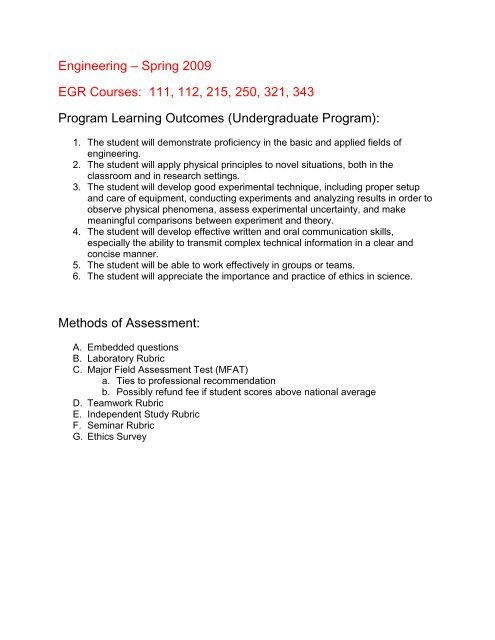

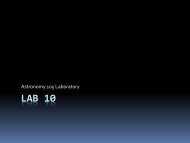
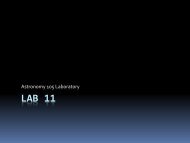
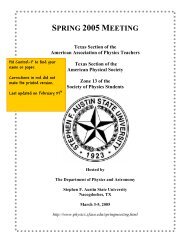
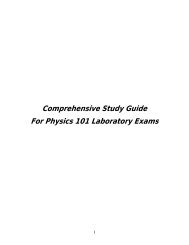
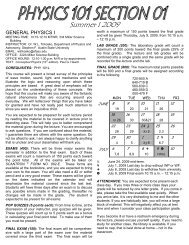
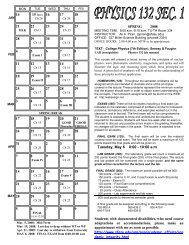
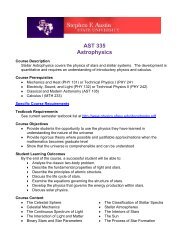
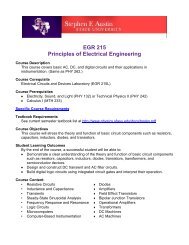
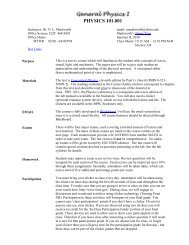
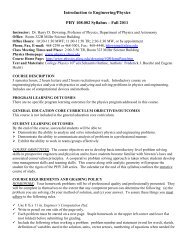
![[pdf] physics 110 fundamentals of electronics](https://img.yumpu.com/29312006/1/190x245/pdf-physics-110-fundamentals-of-electronics.jpg?quality=85)
